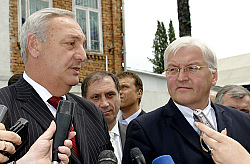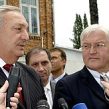
POST-MORTEMS ON THE GERMAN PLAN ON ABKHAZIA
Publication: Eurasia Daily Monitor Volume: 5 Issue: 140
By:

Moscow refined at the last moment its method of killing Berlin’s plan for resolving the Abkhazia conflict. Rather than rejecting the plan outright, as it did initially, Moscow received German Foreign Minister Frank-Walter Steinmeier courteously and seemed prepared to discuss the plan, even terming it a step in the right direction. Moscow, however, killed the plan on the spot by setting unfulfillable pre-conditions. As the Russian official news agency commented, that response “has put a full stop” to the plan (Itar-Tass, July 21).
Russian President Dmitry Medvedev treated Steinmeier to the special courtesy of a “midnight tea” during the night of July 18-19, only to repeat the pre-conditions: Georgian withdrawal from the upper Kodori Valley and the unconditional signing of a Georgian-Abkhaz agreement on non-use of force. Only then would Moscow agree to begin discussions on the German plan (Interfax, July 19, 21).
Russian Minister of Foreign Affairs Sergei Lavrov and the Abkhaz leaders had introduced those pre-conditions at every step of the German diplomatic visits to Georgia, Abkhazia, and Moscow from July 13 through July 19 promoting the plan. The Russians and Abkhaz also insisted as always on retention of the “existing formats” for negotiation and “peacekeeping.” The German plan had not proposed to change those Russian-dominated formats.
Some of those preconditions cancel a prior understanding that the U.S. State Department thought it had achieved with Russia within the UN Secretary-General’s Group of Friends on Georgia, on whose behalf Germany drafted and launched its plan. Washington thought that Moscow had agreed to package the agreement on non-use of force together with an agreement on the return of Georgian expellees to their homes in the Abkhaz-controlled Gali and Ochamchire district. The Russians seemed to approve this linkage during the Group of Friends’ meeting in Berlin on June 30, which ostensibly cleared the German plan.
If Moscow gave that word, it broke it and timed its breach to compromise Steinmeier’s plan when the minister was already on his way. Lavrov went public to say that Georgians and Abkhaz must first “restore confidence” among themselves (through such steps as the Russian pre-conditions) and “only then can discussions be held on the return of refugees.” “The return of refugees is a topic that can be discussed at subsequent stages, after the trust has been restored” (Itar-Tass, July 11, 14, 16, 18).
In such a scenario, Moscow evidently reserves for itself the role of determining whether or when, if ever, the “trust has been restored.” Lavrov even suggested that Georgian refugees should await a return to their homes for as long as Palestinians await their return (Itar-Tass, July 19) — an attack not so much on Georgia as on U.S. policy on an unrelated issue.
U.S. Assistant Secretary of State Matt Bryza (who is also the U.S. representative in the Group of Friends) describes Moscow’s breach as “extremely unhelpful, reject[ing] the core concept … the link between a Georgian non-use-of-force pledge and the return of Georgian refugees to Abkhazia. This is the absolutely essential bargain that must be struck in order to move a peace process forward. If one of the Friends has decided to be against Georgian-Abkhaz direct talks, then that party is making it impossible for the Friends’ agenda to be realized” (RFE/RL interview, July 21).
The German plan had, however, itself weakened that linkage. It calls for a Georgian-Abkhaz exchange of notes on the non-use of force, but only for a start of negotiations about a return of Georgian refugees some time (see EDM, July 22).
Lavrov and other Russian officials sometimes elaborate on their view of a non-use-of-force agreement by adding that it should be “legally binding” on Georgia and Abkhazia as well as “guaranteed.” Undoubtedly, Moscow would insist on those conditions, if and when negotiations get underway toward such an agreement. Those Russian conditions imply quasi-recognition of Abkhazia and a new rationale for the Russian “peacekeeping” troops’ presence as “guarantors.”
Abkhaz leaders listed the same pre-conditions in their meeting with Steinmeier: Georgia’s withdrawal from the upper Kodori Valley, the signing of a non-use-of-force agreement, and return of Georgian refugees only after the “restoration of trust.” Furthermore, refugees could only return to Gali in the context of “agreements signed previously” — i.e., the 1994 Moscow agreement and subsequent documents that cement Russia’s presence and Abkhazia’s secession. Unlike Moscow, however, the Abkhaz leaders ruled out any discussions about Abkhazia’s political status in Georgia. While Moscow regards that issue as potentially negotiable, Sukhumi would only discuss recognition of Abkhazia’s separation from Georgia. By the same token the Abkhaz leades were pleased with the absence of references to Georgia’s territorial integrity in the German plan and welcomed the growing frequency of European visits to Abkhazia (Itar-Tass, July 14, 18, 19; Apsnypress, July 17, 18, 21).
Berlin’s plan in its present form ignores fundamental Georgian interests. Steinmeier heard them during his Tbilisi visit: recognition of territorial integrity (which Steinmeier belatedly acknowledged verbally when asked in Tbilisi), a time-table for return of Georgian expellees to their homes at an early stage of the negotiations (not at some hypothetical concluding stage), reversing Russia’s continual militarization of Abkhazia (without which, “talking about any kind of political solution will be very, very difficult,” Georgian President Mikheil Saakashvili told Steinmeier), transformation of Russia’s “peacekeeping” operation, and cancelation or non-implementation of Russia’s April 16 presidential decree on direct official relations with Abkhazia. The Georgian government seeks talks with the Sukhumi authorities, directly as well as internationally assisted, without pre-conditions (Civil Georgia, July 17-21; RFE/RL, July 18).
The MFA in Berlin considers the possibility of reworking its plan. According to semi-official accounts for the press, the German government carries a “special responsibility” regarding Georgia and will also seek to capitalize on Berlin’s close relations with Moscow in seeking to stabilize the situation in Abkhazia. Apparently, the plan just submitted is to be regarded merely as a “draft,” to be further developed by Berlin (DPA, July 20; Frankfurter Allgemeine Zeitung, July 22). In that case, Berlin will need to demonstrate that its privileged relationship with Moscow can become an asset, not a liability, to German diplomatic initiatives in Europe’s East.




